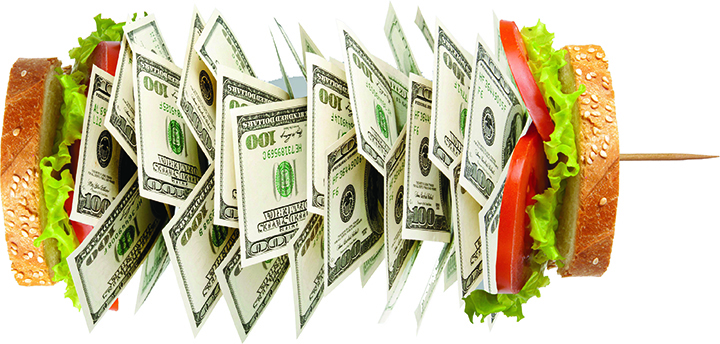As a corporate catering consultant, I inevitably develop an emotional investment in my client’s success. Whether I am engaging in one-to-one coaching or on-site consulting, the first question I ask is the same:
Is your operation…
a) Making money?
b) Breaking even?
c) Losing money?
d) You not sure?
In 2016, I posed this question to 487 of our website members at thecorporatecaterer.com.
The results?
a) Making money (190; 39%)
b) Breaking even (97; 20%)
c) Losing money (93; 19%)
d) Not sure (107; 22%)

Making money
“Are you paying yourself a salary?”
This is my follow up question to this response. If not, your P/L is incomplete. Your salary should be part of the equation. It would be the equivalent of saying, “My labor cost is only 20%—when I don’t include my head chef’s salary.”
This begs the question, “How much should I pay myself?” The answer is, “Whatever you would have to pay someone qualified to do your job.” After you have paid all of your bills, any cash in the bank at the end of your fiscal year is profit.
Breaking even
Breaking even means paying yourself and all current bills. At the end of the year, your bottom-line profit and loss statement is zero. Your business, in essence, has created your job.
Losing money
I try to be direct and to the point. That said, I believe a lot of us in this business are a bit crazy (myself included), but we wear it as a badge of honor. Why else would we voluntarily work in an industry that is notorious for being long on hours and short on profit? Is there a piece of our DNA that makes us gluttons for punishment?
My theory is that we are all privileged victims of this business. Despite the often grueling workload, the unpredictable schedule, the holidays spent working at the cost of family time, and the far from “laughing all-the-way to the bank” reality, most days, we love what we do. In fact, I challenge any other industry to prove their workforce possesses the same level of passion for their craft.
Is there a single owner or operator of a catering company, restaurant, franchise, food-truck, corporate dining facility, or private chef, who is not in business to make money? Making an assumption the answer is “No,” why did only 39% of respondents from my survey report showing a profit?
Let’s examine this perplexing stat. It is usually a combination of factors, including:
• Not keeping a close enough eye on their books.
• Not having an efficient a system for tracking sales and expenses.
• Feeling overwhelmed by the day-to-day pressures of successfully getting orders out the door while putting out fires.
• Have not embraced the concept that every single paid order must yield an acceptable profit margin. Period. It is not your job to provide clients with food and services that they are not budgeted for. All this does is chip away from your bottom line. It is your job to provide clients with proposals and menu options that fit their budgets, while staying true to your prices.
I recently had a client tell me, “For the first time ever, we broke the million dollar mark!”
“That’s terrific,” I replied. “How much money went out the door to reach that million?” As her face scrunched-up, she said, “I’m not sure.” I told her to figure it out and let me know.
She came to my office three days later, looking dejected and haggard. “I have an answer to your question,” she said. “It cost us $1.1 million to generate $1 million. “
Ouch. I would much prefer have a client state, “We did $100,000 in sales, and our expenses, (including an owners salary), were $90,000.” Clearly, this is a better-run operation. I have seen too many owners seduced by their own sales figures. If your core business model is not set-up properly, or you have veered off course, doing more business (even 10 times more) than the other guy doesn’t always mean you are making more money. In fact, it can mean the opposite.
If you are losing money, it’s time to do something about it—now. If you keep pounding your head against the wall long enough, eventually it starts to hurt. If you do not make changes, one day your coffers will run dry. You will be out of business.
Maybe your labor or food costs are higher than they should be? Perhaps it is time to approach your landlord about a rent reduction based on market conditions? Does your catering menu need price adjustments? (Never use the term price increases.) It could be a combination, as well as other operational issues.
You are not sure
First off, there is no shame in this answer. The only shame, after reading this article, would be if getting an answer does not shoot to the very top on your to-do list. Truthfully, I feel the 107 members who answered, “I’m not sure,” is conservative. I sensed sometimes this answer felt embarrassing.
How much money is coming in versus how much is going out. This is Business 101. Ironically, for all of the hours so many of us work, too many operators do not pay close enough attention to the most important factors that determine your chances for success. It reminds me of the adage that people spend more time planning a vacation than they do their retirement.
If you’re not sure, it is time to dive into your books, bills, invoices, accounts payable, and accounts receivable. To whatever degree you think your record keeping is a disaster, I guarantee you I have seen worse. I say, “This is a judgment-free zone. I have walked in your shoes. The mission now is to move forward and right the ship. If you want help, it is available.”
One day, you will decide it is time to sell your business. Showing profitable books will net you the maximum selling price.
Guidelines for a profitable corporate drop-off business
Note: These expenses can vary depending on your specific operation, the State you do business in, and total number of employees (based on percentage of sales).
Food cost: 30% to 32%
Rent/mortgage: 8% to 10%
Labor (including paying yourself): 30% to 31%
Disposables (Paper/plasticware, trays, lids): 3%
Business insurance/Workers comp: 3%
Utilities: 5%
Advertising: 2%
Maintenance/repairs: 3%
Vehicle expenses: 3%
Legal/accounting: 2%
Telephone/internet: 1%
Total Operating Expenses = 90% to 95%
Example: A corporate catering business generating one million dollars in annual revenue.
Total operating expenses (including owners salary) should be $900,000 to $950,000
Bottom-line profit should be $50,000 to $100,000
Carl Sacks, Executive Director of the Leading Caterers of America, recently reported in the November/December 2016 issue of Catersource, “There are some caterers that have shown a pretax profit of over 25%, but the average pre-tax profit of all caterers we have worked with over the years has been 7% to 8%.”
In painting a slightly broader brush, I align with a formula that results in a 5% to 10% profit range. These are tighter margins than other industries—this is why all aspects of your business need to fire on all cylinders.
Gut check
Googling “why my business isn’t making money” will result in plenty of reading material. A list of the usual suspects include, lack of working capital, sloppy record keeping, ineffective marketing, and poor decision-making.
These are all symptoms. They are not the specific problems.
While these symptoms can precipitate your catering business/restaurant struggles, or lack of profit, we must dig deeper. These are some of the bigger, more fundamental problems why you may be the proverbial rat running on the wheel.

1) Unrealistic expectations. Whether your corporate drop-off division is in its infancy, or if you have a solid client base and want to take it to the next level, it is a process. It requires a current state-of-affairs analysis, making a plan, and defining a step-by-step strategy. That is only the beginning—and that is the easy part.
Implementing the plan is where the work begins. Staying fully committed to the plan, with no let-up, even when it feels like you are not getting anywhere (which is not uncommon the first couple of months), is where the real work is. This is what separates the contenders from the pretenders.
Assuming you and your staff are committed and then also follow through with the plan, six months is a good benchmark for when you will look up and say, “OK, I get it. This is starting to all come together.” A key indicator of, “starting to all come together,” is when you begin accumulating repeat business, the golden goose of corporate catering.
2) Handling setbacks. Setbacks are inevitable. More often then not, how the business owner and management team respond to these hurdles will shape the future success or failure of the company.
Even when a colossal event, such as the stock market crashing and the entire economy is knocked off its feet, or widely-reported bad publicity due to a health inspection or safety issue (for example, Chipotle’s recent food-poisoning incidents across the county), there is often much that can be learned, altered, and applied for the future.
3) Not being dependent on a single large account. Our corporate division in Boston generates $2 million annually. Our largest account represents 7.5% of total business. We have committed to not having too many eggs in one basket so that if, or when, we lose a big account, the effects are not devastating.
Much earlier in my career, I was in the opposite situation. We had one huge account that represented almost 50% of our business. It was a great ride for three and a half years. When they decided it was time for a change, it was awful. I had to let staff go and restructure our business model to begin the long, arduous road of building it up again. It was a tough lesson learned. I vowed never to be in that position again.
4) Not monitoring operations. Having tools, metrics, procedures, and systems in place to monitor the key areas of your business is like going to the doctor for a check-up. They allow you to spot potential red flags before they become fatal flaws and help you recognize problem areas so corrective actions can be taken. Many companies fail simply because ownership did not have a finger on the pulse of their own business.
5) Not delegating tasks. Running a catering company/restaurant typically comes with a slew of other titles: manager, marketer, administrator, bookkeeper, salesperson, delivery driver, and chef. While it may be part and parcel of running a smaller operation, there are a few important facts to consider:
• Most people excel in some areas, while they struggle or get by in others.
• An individual’s time, energy, and resources are limited.
• It is impossible for one person to know it all.
• When other people are involved, it brings in different perspectives and ideas to the table.
Once you have a system for tracking progress and measuring results, your vision can defined and focused. When problems or roadblocks present themselves, determine whether they are within your control, or outside your influence. Then begin working to fix what you can. If an issue is out your control, accept what you cannot change. With your team, brainstorm work-around solutions to keep forward progress moving.
6) Track sales and expenses weekly. Revenue is the lifeblood of any business. You need to know where your finances stand at all times. How much money is coming in versus going out? Are you spending the way you planned? If you know the answer to those questions, you can make necessary adjustments as needed by nipping problem issues in the bud.
7) Track progress. Carefully analyze progress. Ask yourself, “How can this operation become more efficient and more profitable?” With your staff, literally walk through your operation as if you were looking at it for the first time. What changes would you make?
8) Poor accounting. You cannot be in control of a business if you don’t know what is going on financially. With bad numbers, or no numbers, a company is flying blind, and it happens more often than you think. Why? For one, it is a common, and disastrous, misconception that an outside accounting firm hired primarily to do the taxes will keep watch over the business. In reality, that is the job of the chief financial officer, one of the many hats an owner has to wear unless you hire a CFO.
9) Leaving money on the table. In an interview with Michael Attias, Founder of Restaurant Catering Systems, he shared, “Restaurants that begin a catering division can generate an additional revenue stream of between 10% to 30%, based on their efforts.” He also noted, “Since the vast majority of catering related expenses are already being covered by the restaurant, 50% of this additional revenue goes right to the bottom line.”
The bottom line
Whether you are making money, losing money, breaking even, or are not sure, don’t you want to know the true financial health of your business? If you are not sure about where things stand financially, or if you are losing money—stop what you are doing right now, and get help. Then, implement a record-keeping system so the days of dumping shoe boxes of invoices at your accountant’s office door in the dead of night are over. Taking back control of your business and experiencing it become profitable, or even more profitable, will feel very good. But don’t wait until you’re concerned about making payroll next week. I’ve been called into those situations. At that point, it is usually too late.
Editor’s note: Michael Rosman and Michael Attias will be conducting an interactive half-day seminar, All Things Corporate Drop Off Catering on March 15, 2017 at Catersource in New Orleans. The session is included in the purchase of a Catersource Connect pass, or can be purchased separately as a one-off, which includes a box lunch and tradeshow floor pass for $59. Click here for more information. http://schedule.catersource.com/track/qsr-drop-off-catering

If you would like to contact Michael Rosman directly about his consulting and coaching services, you may call him at 781-641-3303, email him at [email protected] and visit his membership website www.TheCorporateCaterer.com. Michael is a regular contributor to Catersource, and also has published two books which are available for purchase at www.catersource.com/catersource-store



